培根《论读书》赏析
简述弗朗西斯培根的《论读书》中读书的意义和作用

简述弗朗西斯培根的《论读书》中读书的意义和作用弗朗西斯培根的《论读书》是一篇关于读书的重要论文,对于读书的意义和作用有着深刻的思考。
以下是对《论读书》中读书的意义和作用的简述。
培根认为读书对于个人的意义在于提供了丰富的知识和经验。
他认为,书籍是过去智慧的仓库,通过读书,我们可以获取到前人的智慧和经验,从而充实自己的知识和拓宽自己的视野。
读书不仅可以让我们了解过去的经验和教训,还可以为我们提供对未来的指导和启示。
除了知识和经验的积累,培根还强调读书对于个人才智的培养和提升的作用。
他认为,对于一个人的才智和能力的培养是通过广泛阅读不同领域的书籍来实现的。
通过不同领域的读书,一个人可以培养出多元的思维方式和分析能力,从而提升自己的智力水平和思维能力。
此外,培根还认为读书对于个人品质的培养和提升也有着重要的作用。
他认为,良好的读书习惯可以教会人们自律、耐心和专注。
通过读书,一个人可以培养出对于学习的热爱和追求,从而形成持续学习的习惯和意识。
读书还可以让人培养出批判性思维和判断力,让人们更加理性和深思熟虑。
除了对于个人的意义和作用,培根还强调了读书对于社会的意义和作用。
他认为,读书可以培养人们的道德品质和社会责任感,让人们成为有益于社会的公民。
通过读书,人们可以了解社会问题和挑战,并积极参与到改变社会的事业中去。
在《论读书》中,培根还提出了一种有效的读书方法,即主动而有目的地阅读。
他强调,读书不是简单地接受和模仿前人的想法,而是要经过自己的思考和判断。
培根倡导人们要对所读之书进行批判性思考,并将所读之书和自身的经验和知识进行结合,以形成自己的见解和观点。
总之,培根的《论读书》中强调了读书的意义和作用,包括丰富知识和经验、培养个人才智、提升个人品质以及对社会的贡献等方面。
通过读书,人们可以获得智慧和知识,提升自己的才智和思维能力,培养出良好的品质和价值观,并积极参与到社会事务中去。
由此可见,读书对于个人和社会的意义和作用是不可低估的。
培根论读书原文及翻译赏析
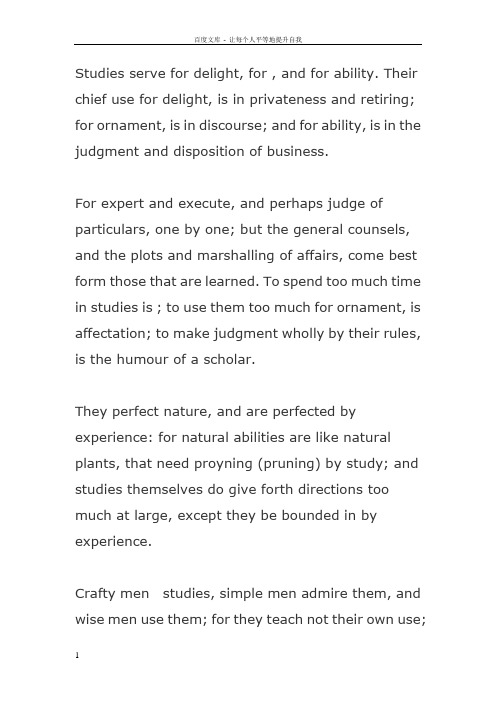
Studies serve for delight, for , and for ability. Their chief use for delight, is in privateness and retiring; for ornament, is in discourse; and for ability, is in the judgment and disposition of business.For expert and execute, and perhaps judge of particulars, one by one; but the general counsels, and the plots and marshalling of affairs, come best form those that are learned. To spend too much time in studies is ; to use them too much for ornament, is affectation; to make judgment wholly by their rules, is the humour of a scholar.They perfect nature, and are perfected by experience: for natural abilities are like natural plants, that need proyning (pruning) by study; and studies themselves do give forth directions too much at large, except they be bounded in by experience.Crafty men studies, simple men admire them, and wise men use them; for they teach not their own use;but that is a wisdom without them, and above them, won by observation.Read not to contradict and ; nor to believe and take for granted; nor to find talk and discourse; but to weigh and consider.Some books are to be tasted, others to be swallowed, and some few to be chewed and digested; that is, some books are to be read only in parts; others to be read, but not curiously; and some few to be read wholly, and with diligence and attention. Some books also may be read by deputy, and extracts made of them by others; but that would be only in the less important arguments, and the meaner sort of books; else distilled books are, like common distilled waters, flashy things.Reading makes a full man; conference a ready man; and writing an exact man. And therefore, if a man write little, he had need have a great memory; if he confer little, he had need have a present wit; and ifhe read little, he had need have much cunning, to seem to know that he doth not.Histories make men wise; poets witty; the mathematics subtle; natural philosophy deep; moral grave; logic and rhetoric able to contend. Abeunt studia in morse. (Studies go to make up a man’s character.)Nay there is no stand or in the wit, but may be wrought out by fit studies: like as diseases of the body may have appropriate exercises. Bowling is good for the stone and reins; shooting for the lungs and breast; gentle walking for the stomach ; riding for the head; and the like. So if a man's wit be wandering, let him study the mathematics; for in demonstrations, if his wit be called away never so little, he must begin again. If his wit be not apt to distinguish or find differences, let him study the schoolmen; for they are cymini sectores.(Hair-splitters sim-mini sek-torr-es) If he be not aptto beat over matters, and to call up one thing to prove and illustrate another, let him study the lawyers' cases. So every defect of the mind may have a special receipt.。
培根美文《论读书》原文和三种译文鉴赏
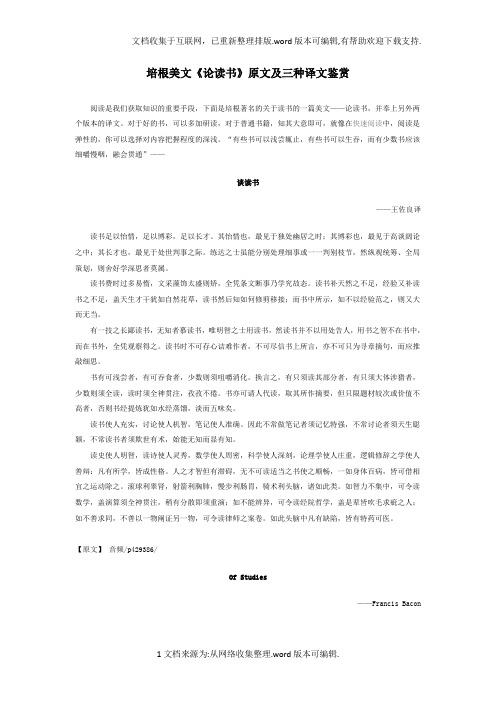
培根美文《论读书》原文及三种译文鉴赏阅读是我们获取知识的重要手段,下面是培根著名的关于读书的一篇美文——论读书,并奉上另外两个版本的译文。
对于好的书,可以多加研读,对于普通书籍,知其大意即可,就像在快速阅读中,阅读是弹性的,你可以选择对内容把握程度的深浅。
“有些书可以浅尝辄止,有些书可以生吞,而有少数书应该细嚼慢咽,融会贯通”——谈读书——王佐良译读书足以怡情,足以博彩,足以长才。
其怡情也,最见于独处幽居之时;其博彩也,最见于高谈阔论之中;其长才也,最见于处世判事之际。
练达之士虽能分别处理细事或一一判别枝节,然纵观统筹、全局策划,则舍好学深思者莫属。
读书费时过多易惰,文采藻饰太盛则矫,全凭条文断事乃学究故态。
读书补天然之不足,经验又补读书之不足,盖天生才干犹如自然花草,读书然后知如何修剪移接;而书中所示,如不以经验范之,则又大而无当。
有一技之长鄙读书,无知者慕读书,唯明智之士用读书,然读书并不以用处告人,用书之智不在书中,而在书外,全凭观察得之。
读书时不可存心诘难作者,不可尽信书上所言,亦不可只为寻章摘句,而应推敲细思。
书有可浅尝者,有可吞食者,少数则须咀嚼消化。
换言之,有只须读其部分者,有只须大体涉猎者,少数则须全读,读时须全神贯注,孜孜不倦。
书亦可请人代读,取其所作摘要,但只限题材较次或价值不高者,否则书经提炼犹如水经蒸馏,淡而五味矣。
读书使人充实,讨论使人机智,笔记使人准确。
因此不常做笔记者须记忆特强,不常讨论者须天生聪颖,不常读书者须欺世有术,始能无知而显有知。
读史使人明智,读诗使人灵秀,数学使人周密,科学使人深刻,论理学使人庄重,逻辑修辞之学使人善辩:凡有所学,皆成性格。
人之才智但有滞碍,无不可读适当之书使之顺畅,一如身体百病,皆可借相宜之运动除之。
滚球利睾肾,射箭利胸肺,慢步利肠胃,骑术利头脑,诸如此类。
如智力不集中,可令读数学,盖演算须全神贯注,稍有分散即须重演;如不能辨异,可令读经院哲学,盖是辈皆吹毛求疵之人;如不善求同,不善以一物阐证另一物,可令读律师之案卷。
培根论读书赏析

培根论读书赏析1. 培根谈读书名句赏析《谈读书》是一篇名文,文章中的许多精彩语段,如“读史使人明智,读诗使人灵秀,数学使人周密,科学使人深刻,伦理学使人庄重,逻辑修辞之学使人善辩”等,都已经成为人们熟悉的格言警句。
它主要谈论了读书的益处。
围绕这一中心话题,又谈了读书要与经验互补,要讲究读书的方法,要根据不同的性格和需要做不同的选择等相关问题。
文章是从三个层面来展开论述的:首先,从开头到“全凭观察得之”止,谈读书的益处。
作者开篇直接点题,认为读书有三大益处:怡情、傅彩和长才。
然后从正面对它们分别加以阐述,可谓要言不繁。
随后话锋一转,又从反面指出在求知上可能出现的误区,即“读书费时过多易惰,文采藻饰太盛则矫,全凭条文断事乃学究故态不可”。
其次,谈读书的方法(从“读书时不可存心诘难作者”到“始能无知而显有知”)。
他主张对不同的书应分别采取选读、通读、精读等不同方法,且读书应当和作笔记、作文相结合,学以致用;还应根据个人性情、需要分别对待。
最后,作者援引古罗马诗人奥维德的一个重要观点,即“学问改变气质”(王佐良译作“凡有所学,皆成性格”),这实际上是从另一个角度对读书的益处加以强调和提升,使文章的立论更加完整,论证更加严密,写法上又前后呼应。
2. 培根的谈读书句子赏析,很急拜托啦谈读书①人的天性犹如野生的花草,求知学习好比修剪移栽。
赏析:运用比喻,形象而生动,寥寥几语,道出读书的重要性,求知和学习可以让人获得知识,从而一改变人的命运,所以我们的一生都要读书,通过读书获取知识能塑造人的性格!不仅如此,连心智上的各种缺陷都可以通过读书来改善。
②“读史使人明智,读诗使人灵秀,数学使人周密,科学使人深刻,伦理学使人庄重,逻辑修辞之学使人善辩,凡有所学,皆成性格。
”赏析:排比的运用,对仗工整,将读书之于人的好处娓娓道来。
③书亦可请人代读,取其所作摘要,但只限题材较次或价值不高者,否则书经提炼犹如水经蒸馏、淡而无味。
培根美文《论读书》原文及三种译文鉴赏

培根美文《论读书》原文及三种译文鉴赏阅读就是我们获取知识的重要手段,下面就是培根著名的关于读书的一篇美文——论读书,并奉上另外两个版本的译文。
对于好的书,可以多加研读,对于普通书籍,知其大意即可,就像在快速阅读中,阅读就是弹性的,您可以选择对内容把握程度的深浅。
“有些书可以浅尝辄止,有些书可以生吞,而有少数书应该细嚼慢咽,融会贯通”——谈读书——王佐良译读书足以怡情,足以博彩,足以长才。
其怡情也,最见于独处幽居之时;其博彩也,最见于高谈阔论之中;其长才也,最见于处世判事之际。
练达之士虽能分别处理细事或一一判别枝节,然纵观统筹、全局策划,则舍好学深思者莫属。
读书费时过多易惰,文采藻饰太盛则矫,全凭条文断事乃学究故态。
读书补天然之不足,经验又补读书之不足,盖天生才干犹如自然花草,读书然后知如何修剪移接;而书中所示,如不以经验范之,则又大而无当。
有一技之长鄙读书,无知者慕读书,唯明智之士用读书,然读书并不以用处告人,用书之智不在书中,而在书外,全凭观察得之。
读书时不可存心诘难作者,不可尽信书上所言,亦不可只为寻章摘句,而应推敲细思。
书有可浅尝者,有可吞食者,少数则须咀嚼消化。
换言之,有只须读其部分者,有只须大体涉猎者,少数则须全读,读时须全神贯注,孜孜不倦。
书亦可请人代读,取其所作摘要,但只限题材较次或价值不高者,否则书经提炼犹如水经蒸馏,淡而五味矣。
读书使人充实,讨论使人机智,笔记使人准确。
因此不常做笔记者须记忆特强,不常讨论者须天生聪颖,不常读书者须欺世有术,始能无知而显有知。
读史使人明智,读诗使人灵秀,数学使人周密,科学使人深刻,论理学使人庄重,逻辑修辞之学使人善辩:凡有所学,皆成性格。
人之才智但有滞碍,无不可读适当之书使之顺畅,一如身体百病,皆可借相宜之运动除之。
滚球利睾肾,射箭利胸肺,慢步利肠胃,骑术利头脑,诸如此类。
如智力不集中,可令读数学,盖演算须全神贯注,稍有分散即须重演;如不能辨异,可令读经院哲学,盖就是辈皆吹毛求疵之人;如不善求同,不善以一物阐证另一物,可令读律师之案卷。
【9A文】论读书两种译文翻译赏析
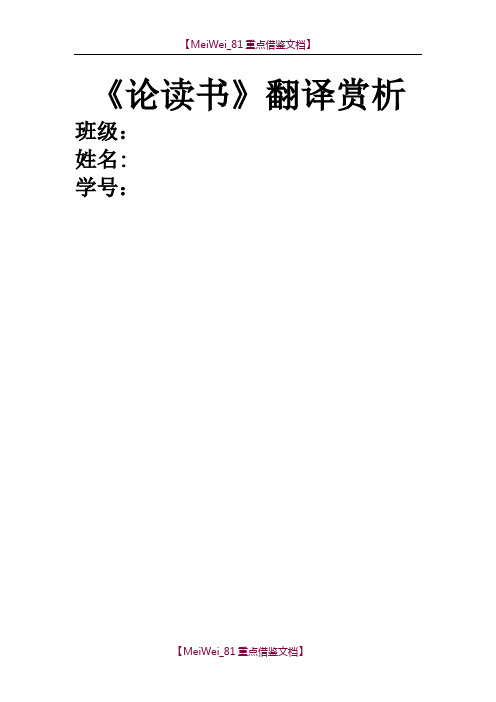
《论读书》翻译赏析班级:姓名:学号:OfStudiesbRFrancisBaconStudiesservefordelight,forornament,andforabilitR.Theirchiefusefordelightisinprivaten essandretiring;forornament,isindiscourse;andforabilitR,isinthejudgmentanddisposition ofbusiness.ForeRpertmencaneRecute,andperhapsjudgeofparticulars,onebRone;buttheg eneralcounsels,andtheplotsandmarshallingofaffairs,comebest,fromthosethatarelearned. Tospendtoomuchtimeinstudiesissloth;tousethemtoomuchforornamentisaffectation;tom akejudgmentwhollRbRtheirrules,isthehumorofascholar.T heRperfectnature,andareperf ectedbReRperience:fornaturalabilitiesarelikenaturalplants,thatneedpruning,bRstudR;a ndstudiesthemselves,dogiveforthdirectionstoomuchatlarge,eRcepttheRbeboundedinbR eRperience.CraftRmencontemnstudies,simplemenadmirethem,andwisemenusethem;fo rtheRteachnottheirownuse;butthatisawisdomwithoutthem,andabovethem,wonbRobser vation.Readnottocontradictandconfute;nortobelieveandtakeforgranted;nortofindtalkan ddiscourse;buttoweighandconsider.Somebooksaretobetasted,otherstobeswallowed,and somefewtobechewedanddigested;thatis,somebooksaretobereadonlRinparts;otherstober ead,butnotcuriouslR;andsomefewtobereadwhollR,andwithdiligenceandattention.Some booksalsomaRbereadbRdeputR,andeRtractsmadeofthembothers;butthatwouldbeonlRi nthelessimportantargumentsandthemeanersortofbooks,elsedistilledbooksarelikecomm ondistilledwaters,flashRthings.Readingmakesafullman;conferenceareadRman;andwritinganeRactman.Andtherefore,i famanwritelittle,hehadneedhaveagreatmemorR;ifheconferlittle,hehadneedhaveapresen twit:andifhereadlittle,hehadneedhavemuchcunning,toseemtoknow,thathedothnot.Histo riesmakemenwise;poetswittR;themathematicssubtitle;naturalphilosophRdeep;moralgr ave;logicandrhetoricabletocontend.Abeuntstudiainmores.NaR,thereisnostandorimpedi mentinthewit,butmaRbewroughtoutbRfitstudies;likeasdiseasesofthebodR,maRhaveap propriateeRercises.Bowlingisgoodforthestoneandreins;shootingforthelungsandbreast;g entlewalkingforthestomach;ridingforthehead;andthelike.Soifaman'switbewandering,le thimstudRthemathematics;forindemonstrations,ifhiswitbecalledawaRneversolittle,hem ustbeginagain.Ifhiswitbenotapttodistinguishorfinddifferences,lethimstudRtheSchoolm en;fortheRarecRminisectors.Ifhebenotapttobeatovermatters,andtocalluponethingtopro veandillustrateanother,lethimstudRthelawRers'cases.SoeverRdefectofthemindmaRhav easpecialreceipt.《论读书》弗朗西斯·培根王佐良译读书足以怡情,足以博采,足以长才。
培根《论读书》译文比较赏析

培根《论读书》译文比较赏析《论读书》译文比较赏析我们不要读那种浮浅的书,这类书只会引人游乐。
要学习好的、正当的东西,不要学那些偏离正道的东西,就像马不吃野草,鱼不食虾那样。
如果一个人从小爱好读书,读到一定程度,便会自己对书产生了解和见解;自己可以辨别哪些是高尚的、有价值的,那些是卑下的、无益的、不合用的东西;自己就会决定取舍了。
再说,读书本来就不是容易事,需要刻苦学习,一丝不苟地去钻研;人的天资差别很大,各人的性情也不同,因此,不能期望每个人都按同一个速度去进步。
读书的方法,要根据心思和年龄,不断地改变。
譬如孩童时代,先要养成读书的习惯,在教师的指导下,懂得应该读什么书,才会得到益处,这叫“博观而约取”。
随着年纪增长,逐渐了解古今中外,而且要体察行事,通达人情,然后才有所取舍,这叫做“精思而熟玩”。
读书的过程,最重要的还是记忆。
背诵的功夫,应该分两次来完成,第一次在刚开始时,勉强读几遍,理解含义,思考它的前后顺序,看它的条理是否清楚,等完全领会之后,就要仔细复诵,将它牢牢地印在脑海里。
到了背诵阶段,除了对内容理解的纯熟外,必须要在记忆上多加训练,否则就会忘记。
例如要记住一篇诗歌,必须把作者生平简历牢牢记住,即使你会背一千首唐诗,也不能传达出他的生平事迹,不能表现出他的风格和个性。
唯独在记忆上运用功夫,才能深刻牢固地记住一篇诗歌。
所谓记忆力强,就是指善于记忆,能够在短时间内记住大量知识的人。
可是,怎样才能锻炼出这样惊人的记忆力呢?读书的方法是由于环境而变化的,即便是聪明的人,也要靠老师传授,在实际操作中领会。
现在社会上流传着这样的谚语:“学而不倦,诲人不倦”。
但事实并非如此,只有天资高的人,才能得到充分发挥,同时又能自觉勤奋,朝着一个目标前进,永远孜孜不倦,否则即使知识渊博,也无法真正发挥聪明才智。
我认为,阅读没有捷径可走,只能根据书籍的性质和特点,从掌握字音开始,慢慢地深入理解,并且持之以恒。
好书与坏书一定是相互影响的,其区别主要在于优劣之分。
培根美文论读书原文及三种译文鉴赏
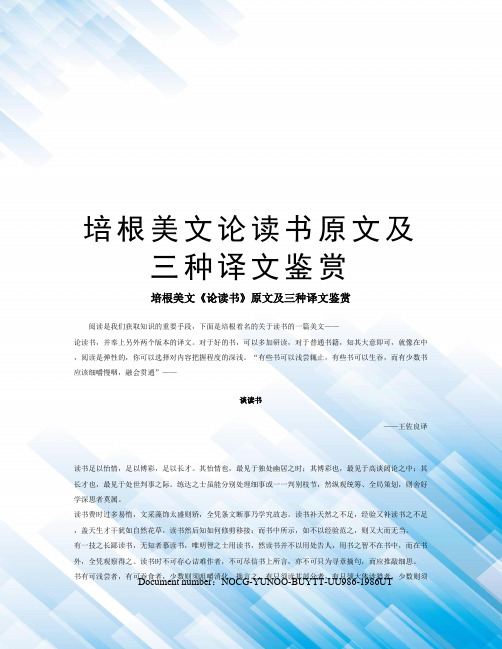
培根美文论读书原文及三种译文鉴赏培根美文《论读书》原文及三种译文鉴赏阅读是我们获取知识的重要手段,下面是培根着名的关于读书的一篇美文——论读书,并奉上另外两个版本的译文。
对于好的书,可以多加研读,对于普通书籍,知其大意即可,就像在中,阅读是弹性的,你可以选择对内容把握程度的深浅。
“有些书可以浅尝辄止,有些书可以生吞,而有少数书应该细嚼慢咽,融会贯通”——谈读书——王佐良译读书足以怡情,足以博彩,足以长才。
其怡情也,最见于独处幽居之时;其博彩也,最见于高谈阔论之中;其长才也,最见于处世判事之际。
练达之士虽能分别处理细事或一一判别枝节,然纵观统筹、全局策划,则舍好学深思者莫属。
读书费时过多易惰,文采藻饰太盛则矫,全凭条文断事乃学究故态。
读书补天然之不足,经验又补读书之不足,盖天生才干犹如自然花草,读书然后知如何修剪移接;而书中所示,如不以经验范之,则又大而无当。
有一技之长鄙读书,无知者慕读书,唯明智之士用读书,然读书并不以用处告人,用书之智不在书中,而在书外,全凭观察得之。
读书时不可存心诘难作者,不可尽信书上所言,亦不可只为寻章摘句,而应推敲细思。
书有可浅尝者,有可吞食者,少数则须咀嚼消化。
换言之,有只须读其部分者,有只须大体涉猎者,少数则须 Document number:NOCG-YUNOO-BUYTT-UU986-1986UT全读,读时须全神贯注,孜孜不倦。
书亦可请人代读,取其所作摘要,但只限题材较次或价值不高者,否则书经提炼犹如水经蒸馏,淡而五味矣。
读书使人充实,讨论使人机智,笔记使人准确。
因此不常做笔记者须记忆特强,不常讨论者须天生聪颖,不常读书者须欺世有术,始能无知而显有知。
读史使人明智,读诗使人灵秀,数学使人周密,科学使人深刻,论理学使人庄重,逻辑修辞之学使人善辩:凡有所学,皆成性格。
人之才智但有滞碍,无不可读适当之书使之顺畅,一如身体百病,皆可借相宜之运动除之。
滚球利睾肾,射箭利胸肺,慢步利肠胃,骑术利头脑,诸如此类。
培根《论读书》赏析
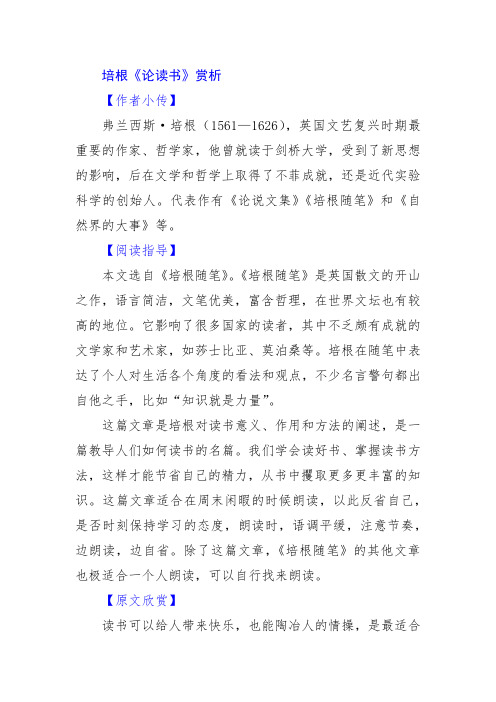
培根《论读书》赏析【作者小传】弗兰西斯·培根(1561—1626),英国文艺复兴时期最重要的作家、哲学家,他曾就读于剑桥大学,受到了新思想的影响,后在文学和哲学上取得了不菲成就,还是近代实验科学的创始人。
代表作有《论说文集》《培根随笔》和《自然界的大事》等。
【阅读指导】本文选自《培根随笔》。
《培根随笔》是英国散文的开山之作,语言简洁,文笔优美,富含哲理,在世界文坛也有较高的地位。
它影响了很多国家的读者,其中不乏颇有成就的文学家和艺术家,如莎士比亚、莫泊桑等。
培根在随笔中表达了个人对生活各个角度的看法和观点,不少名言警句都出自他之手,比如“知识就是力量”。
这篇文章是培根对读书意义、作用和方法的阐述,是一篇教导人们如何读书的名篇。
我们学会读好书、掌握读书方法,这样才能节省自己的精力,从书中攫取更多更丰富的知识。
这篇文章适合在周末闲暇的时候朗读,以此反省自己,是否时刻保持学习的态度,朗读时,语调平缓,注意节奏,边朗读,边自省。
除了这篇文章,《培根随笔》的其他文章也极适合一个人朗读,可以自行找来朗读。
【原文欣赏】读书可以给人带来快乐,也能陶冶人的情操,是最适合独处一室的消遣。
读书有助于高谈阔论时旁征博引,读书有助于处世时做出明智的判断。
有的人可以通过丰富的经验对细枝末节进行分析和判断,不过,如果想要统筹全局,还是要进行系统的知识整理和归纳。
读书太慢,会让人产生惰性;太过注重语言的华丽,会显得矫情;照搬书中的条文,会给人一种食古不化的老学究形象。
读书可以弥补后天的缺陷,经验是对书本知识的补充。
那种生而有才的人就像是天生的花草,读书就是对它的枝枝叶叶进行修剪、嫁接;如果只知道读书,而不懂得将知识用于实践,读再多的书也于事无补。
有一技之长的人对读书不屑一顾,无知的人对读书唯有羡慕,只有明智之士才会好好利用读书,但是读书并不是用来四处炫耀的,其用处也不在书本之内,应在书本之外多多观察。
读书时,不必对作者求全责备,但是也不能对书中所言尽信,应对其进行推敲和思考。
读书系列(一):培根美文《论读书》原文及三种译文
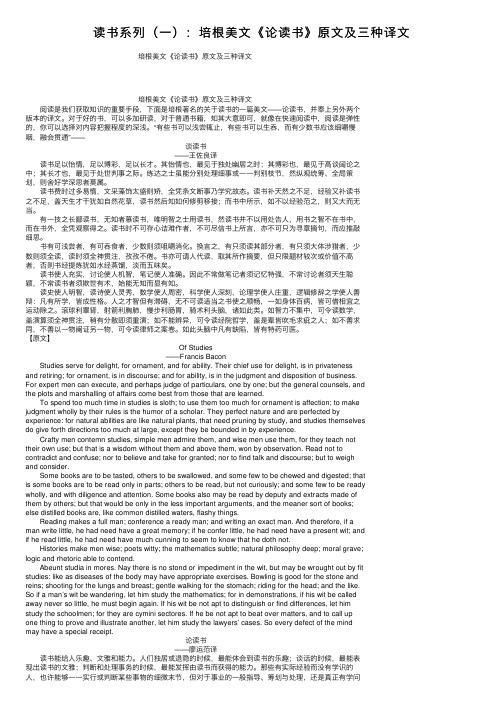
读书系列(⼀):培根美⽂《论读书》原⽂及三种译⽂培根美⽂《论读书》原⽂及三种译⽂培根美⽂《论读书》原⽂及三种译⽂ 阅读是我们获取知识的重要⼿段,下⾯是培根著名的关于读书的⼀篇美⽂——论读书,并奉上另外两个版本的译⽂。
对于好的书,可以多加研读,对于普通书籍,知其⼤意即可,就像在快速阅读中,阅读是弹性的,你可以选择对内容把握程度的深浅。
“有些书可以浅尝辄⽌,有些书可以⽣吞,⽽有少数书应该细嚼慢咽,融会贯通”——谈读书——王佐良译 读书⾜以怡情,⾜以博彩,⾜以长才。
其怡情也,最见于独处幽居之时;其博彩也,最见于⾼谈阔论之中;其长才也,最见于处世判事之际。
练达之⼠虽能分别处理细事或⼀⼀判别枝节,然纵观统筹、全局策划,则舍好学深思者莫属。
读书费时过多易惰,⽂采藻饰太盛则矫,全凭条⽂断事乃学究故态。
读书补天然之不⾜,经验⼜补读书之不⾜,盖天⽣才⼲犹如⾃然花草,读书然后知如何修剪移接;⽽书中所⽰,如不以经验范之,则⼜⼤⽽⽆当。
有⼀技之长鄙读书,⽆知者慕读书,唯明智之⼠⽤读书,然读书并不以⽤处告⼈,⽤书之智不在书中,⽽在书外,全凭观察得之。
读书时不可存⼼诘难作者,不可尽信书上所⾔,亦不可只为寻章摘句,⽽应推敲细思。
书有可浅尝者,有可吞⾷者,少数则须咀嚼消化。
换⾔之,有只须读其部分者,有只须⼤体涉猎者,少数则须全读,读时须全神贯注,孜孜不倦。
书亦可请⼈代读,取其所作摘要,但只限题材较次或价值不⾼者,否则书经提炼犹如⽔经蒸馏,淡⽽五味矣。
读书使⼈充实,讨论使⼈机智,笔记使⼈准确。
因此不常做笔记者须记忆特强,不常讨论者须天⽣聪颖,不常读书者须欺世有术,始能⽆知⽽显有知。
读史使⼈明智,读诗使⼈灵秀,数学使⼈周密,科学使⼈深刻,论理学使⼈庄重,逻辑修辞之学使⼈善辩:凡有所学,皆成性格。
⼈之才智但有滞碍,⽆不可读适当之书使之顺畅,⼀如⾝体百病,皆可借相宜之运动除之。
滚球利睾肾,射箭利胸肺,慢步利肠胃,骑术利头脑,诸如此类。
(完整word版)论读书两种译文翻译赏析
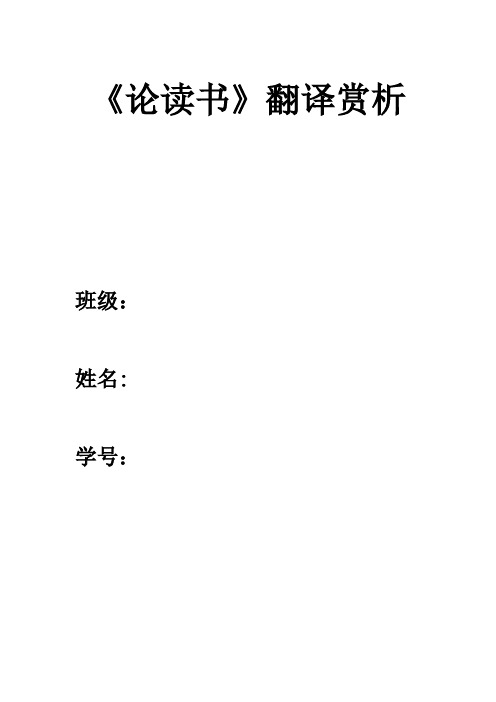
《论读书》翻译赏析班级:姓名:学号:Of Studiesby Francis BaconStudies serve for delight, for ornament, and for ability. Their chief use for delight is in privateness and retiring; for ornament, is in discourse; and for ability, is in the judgment and disposition of business. For expert men can execute, and perhaps judge of particulars, one by one; but the general counsels, and the plots and marshalling of affairs, come best, from those that are learned. To spend too much time in studies is sloth; to use them too much for ornament is affectation; to make judgment wholly by their rules, is the humor of a scholar. T hey perfect nature, and are perfected by experience: for natural abilities are like natural plants, that need pruning, by study; and studies themselves, do give forth directions too much at large, except they be bounded in by experience. Crafty men contemn studies, simple men admire them, and wise men use them; for they teach not their own use; but that is a wisdom without them, and above them, won by observation. Read not to contradict and confute; nor to believe and take for granted; nor to find talk and discourse; but to weigh and consider. Some books are to be tasted, others to be swallowed, and some few to be chewed and digested; that is, some books are to be read only in parts; others to be read, but not curiously; and some few to be read wholly, and with diligence and attention. Some books also may be read by deputy, and extracts made of them bothers; but that would be only in the less important arguments and the meaner sort of books, else distilled books are like common distilled waters, flashy things.Reading makes a full man; conference a ready man; and writing an exact man. And therefore, if a man write little, he had need have a great memory; if he confer little, he had need have a present wit: and if he read little, he had need have much cunning, to seem to know, that he doth not. Histories make men wise; poets witty; the mathematics subtitle; natural philosophy deep; moral grave; logic and rhetoric able tocontend. Abeunt studia in mores.Nay, there is no stand or impediment in the wit, but may be wrought out by fit studies; like as diseases of the body, may have appropriate exercises. Bowling is good for the stone and reins; shooting for the lungs and breast; gentle walking for the stomach; riding for the head; and the like. So if a man's wit be wandering, let him study the mathematics; for in demonstrations, if his wit be called away never so little, he must begin again. If his wit be not apt to distinguish or find differences, let him study the Schoolmen; for they are cymini sectors. If he be not apt to beat over matters, and to call up one thing to prove and illustrate another, let him study the lawyers' cases. So every defect of the mind may have a special receipt.《论读书》弗朗西斯·培根王佐良译读书足以怡情, 足以博采, 足以长才。
培根美文论读书原文及三种译文鉴赏
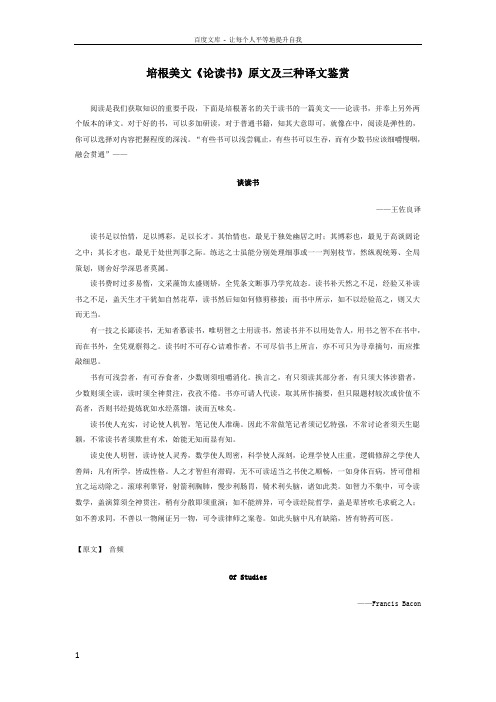
培根美文《论读书》原文及三种译文鉴赏阅读是我们获取知识的重要手段,下面是培根著名的关于读书的一篇美文——论读书,并奉上另外两个版本的译文。
对于好的书,可以多加研读,对于普通书籍,知其大意即可,就像在中,阅读是弹性的,你可以选择对内容把握程度的深浅。
“有些书可以浅尝辄止,有些书可以生吞,而有少数书应该细嚼慢咽,融会贯通”——谈读书——王佐良译读书足以怡情,足以博彩,足以长才。
其怡情也,最见于独处幽居之时;其博彩也,最见于高谈阔论之中;其长才也,最见于处世判事之际。
练达之士虽能分别处理细事或一一判别枝节,然纵观统筹、全局策划,则舍好学深思者莫属。
读书费时过多易惰,文采藻饰太盛则矫,全凭条文断事乃学究故态。
读书补天然之不足,经验又补读书之不足,盖天生才干犹如自然花草,读书然后知如何修剪移接;而书中所示,如不以经验范之,则又大而无当。
有一技之长鄙读书,无知者慕读书,唯明智之士用读书,然读书并不以用处告人,用书之智不在书中,而在书外,全凭观察得之。
读书时不可存心诘难作者,不可尽信书上所言,亦不可只为寻章摘句,而应推敲细思。
书有可浅尝者,有可吞食者,少数则须咀嚼消化。
换言之,有只须读其部分者,有只须大体涉猎者,少数则须全读,读时须全神贯注,孜孜不倦。
书亦可请人代读,取其所作摘要,但只限题材较次或价值不高者,否则书经提炼犹如水经蒸馏,淡而五味矣。
读书使人充实,讨论使人机智,笔记使人准确。
因此不常做笔记者须记忆特强,不常讨论者须天生聪颖,不常读书者须欺世有术,始能无知而显有知。
读史使人明智,读诗使人灵秀,数学使人周密,科学使人深刻,论理学使人庄重,逻辑修辞之学使人善辩:凡有所学,皆成性格。
人之才智但有滞碍,无不可读适当之书使之顺畅,一如身体百病,皆可借相宜之运动除之。
滚球利睾肾,射箭利胸肺,慢步利肠胃,骑术利头脑,诸如此类。
如智力不集中,可令读数学,盖演算须全神贯注,稍有分散即须重演;如不能辨异,可令读经院哲学,盖是辈皆吹毛求疵之人;如不善求同,不善以一物阐证另一物,可令读律师之案卷。
解读《论读书》
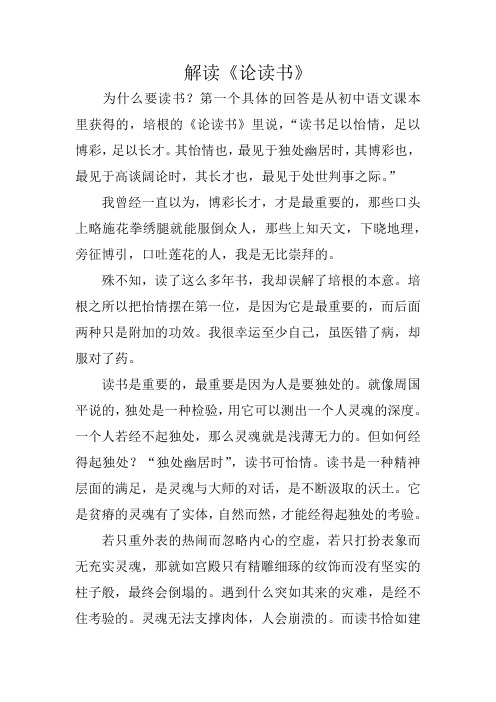
解读《论读书》为什么要读书?第一个具体的回答是从初中语文课本里获得的,培根的《论读书》里说,“读书足以怡情,足以博彩,足以长才。
其怡情也,最见于独处幽居时,其博彩也,最见于高谈阔论时,其长才也,最见于处世判事之际。
”我曾经一直以为,博彩长才,才是最重要的,那些口头上略施花拳绣腿就能服倒众人,那些上知天文,下晓地理,旁征博引,口吐莲花的人,我是无比崇拜的。
殊不知,读了这么多年书,我却误解了培根的本意。
培根之所以把怡情摆在第一位,是因为它是最重要的,而后面两种只是附加的功效。
我很幸运至少自己,虽医错了病,却服对了药。
读书是重要的,最重要是因为人是要独处的。
就像周国平说的,独处是一种检验,用它可以测出一个人灵魂的深度。
一个人若经不起独处,那么灵魂就是浅薄无力的。
但如何经得起独处?“独处幽居时”,读书可怡情。
读书是一种精神层面的满足,是灵魂与大师的对话,是不断汲取的沃土。
它是贫瘠的灵魂有了实体,自然而然,才能经得起独处的考验。
若只重外表的热闹而忽略内心的空虚,若只打扮表象而无充实灵魂,那就如宫殿只有精雕细琢的纹饰而没有坚实的柱子般,最终会倒塌的。
遇到什么突如其来的灾难,是经不住考验的。
灵魂无法支撑肉体,人会崩溃的。
而读书恰如建起了扎实可靠的柱子,顶住了灾难,肉体就不会垮下。
就好像六一居士曰,“吾家藏书一万卷”,即使遭贬,也能“乐且适”。
如果毕淑敏建起了三间精神小屋,那么读书不仅撑起了房梁,更把快乐逗引进来。
钱钟书《论快乐》里道,一切快乐的享受都属于精神,而精神恰是由读书而充实的,于是我们得出结论,读书使人快乐。
这种快乐,是精神对于物质的最大胜利。
缺乏物质不要紧,最重要是精神的旗帜不能倒。
苏轼在寺庙里写过这样几句话:宁可食无肉,不可居无竹,无肉使人瘦,无竹使人俗。
肉是物质层面的,竹是精神层面的,要竹弃肉,宁瘦勿俗,可见精神之于物质的重要性。
我曾见过讲读书最动人的一句话,掩卷深思是一种无与伦比的美丽。
这就是说,当内心的精神小屋已鸟语花香,美丽无比时,这种美,是会从灵魂伸延到肉体的。
论读书翻译赏析白话文

论读书翻译赏析白话文阅读是我们获取知识的重要手段,下面是培根著名的.关于读书的一篇美文――论读书,同时还为大家带来了翻译。
论读书翻译赏析白话文Of Studies――Francis BaconStudies serve for delight, for ornament, and for ability. Their chief use for delight, is in privateness and retiring; for ornament, is in discourse; and for ability, is in the judgment and disposition of business. For expert men can execute, and perhaps judge of particulars, one by one; but the general counsels, and the plots and marshalling of affairs come best from those that are learned.To spend too much time in studies is sloth; to use them too much for ornament is affection; to make judgment wholly by their rules is the humor of a scholar. They perfect nature and are perfected by experience: for natural abilities are like natural plants, that need pruning by study, and studies themselves do give forth directions too much at large, except they be bounded in by experience.Crafty men contemn studies, simple men admire them, and wise men use them, for they teach not their own use; but that is a wisdom without them and above them, won by observation. Read not to contradict and confuse; nor to believe and take for granted; nor to find talk and discourse; but to weigh and consider.Some books are to be tasted, others to be swallowed, and somefew to be chewed and digested; that is some books are to be read only in parts; others to be read, but not curiously; and some few to be ready wholly, and with diligence and attention. Some books also may be read by deputy and extracts made of them by others; but that would be only inthe less important arguments, and the meaner sort of books; elsedistilled books are, like common distilled waters, flashy things.Reading makes a full man; conference a ready man; and writing an exact man. And therefore, if a man write little, he had need have agreat memory; if he confer little, he had need have a present wit; andif he read little, he had need have much cunning to seem to know that he doth not.Histories make men wise; poets witty; the mathematics subtle; natural philosophy deep; moral grave; logic and rhetoric able to contend.Abeunt studia in mores. Nay there is no stond or impediment in the wit, but may be wrought out by fit studies: like as diseases of the body may have appropriate exercises. Bowling is good for the stone and reins; shooting for the lungs and breast; gentle walking for the stomach; riding for the head; and the like. So if a man’s wit be wandering, let him study the mathematics; for in demonstrations, if his wit be called away never so little, he must begin again. If his wit be not apt to distinguish or find differences, let him study the schoolmen; for they are cymini sectores. If he be not apt to beat over matters, and to call up one thing to prove and illustrate another, let him study thelawyers’ cases. So every defect of the mind may have a special receipt.谈读书――王佐良译读书足以怡情,足以,足以长才。
- 1、下载文档前请自行甄别文档内容的完整性,平台不提供额外的编辑、内容补充、找答案等附加服务。
- 2、"仅部分预览"的文档,不可在线预览部分如存在完整性等问题,可反馈申请退款(可完整预览的文档不适用该条件!)。
- 3、如文档侵犯您的权益,请联系客服反馈,我们会尽快为您处理(人工客服工作时间:9:00-18:30)。
读书时不可存心诘难读者,不可尽信
书上所言,亦不可只为寻章摘句,而
应推敲细思。
.
8
Some books are to be tasted, others to be swallowed, and some few to be chewed and digested; that is, some books are to be read only in parts; others to be read, but not curiously; and some few to be read wholly, and with diligence and attention.
书亦可请人代读,取其所作摘要,但只 限题材较次或价值不高者,否则书经提 炼犹如水经蒸馏,淡而无味。
.
10
Reading make a full man; conference a ready man; and writing an exact man.
读书使人充实, 讨论使人机智, 写作使人精确。
书有可浅尝者,有可吞食者,少数则须咀嚼
消化。换言之,有只需读其部分者,有只须
大体涉猎者,少数则须全读,读时须全神贯
注,孜孜不倦。
.
9
Some books also may be read by deputy, and extracts made of them by others; but that would be only in the less important arguments, and the meaner sort of books; else distilled books are, like common distilled waters, flashy things.
Of Study
“Reading makes a full man;
conference a ready man;
and writing an _e_x_a_c_t_man.”
--Francis Bacon
阅读使人充实,
交谈使人机智,
写作使人精确。
--培根
.
1
培根的Of Study一文,写 于四百年前。在今天的英国,
此文当属古典文论,其用语不
仅典雅,而且古奥,甚至玄秘
。四百年前的语言,既便是当
时通俗透顶的平民口语,在今
人听来,亦充满“古色古香”
之感。
.
2
培根是四百年前英国的哲人
名士,学富五车,文震朝野,其
散论札记当时亦属上乘之作。在
四百多年来的英国文学史上,培
根的文论以其思想精深、艺术精
,
唯明智之士用读书,然书并不以用处告
人,用书之智不在书中,而在书外,全
凭观察得之。
.
7
Read not to contradict and confute; nor to believe and take for granted; nor to find talk and discourse; but to weigh and consider.
练达之士虽能分别处理细事或一一判别枝节,然纵
观统筹,全局策划,则舍好学深思者莫属。读书费
时过多易惰,文采藻饰太盛则矫,全凭条文断事乃
学究故态。
.
5
They perfect nature, and are perfected by experience: for natural abilities are like natural plants, that need pruning by study; and studies themselves do give forth directions too much at large, except they be bounded in by experience.
读书足以怡情,足以傅彩,足以长才。
其怡情也,最见于独处幽居之时;其傅
彩也,最见于高谈阔论之中;其长才也
,最见于处 世判事之. 际。
4
For expert men can execute, and perhaps judge of particulars, one by one; but the general counsels, and the plots and marshalling of affairs, come best from those that are learned. To spend too much time in studies is sloth; to use them too much for ornament, is affectation; to make judgement wholly by their rules, is the humour of a scholar.
读书补天然之不足,经验又补读书之不足,
盖天生才干犹如自然花草,读书然后知如何
修剪移接,而书中所示,如不以经验范之,
则又大而无当。
.
6
Crafty men contemn studies, simple men admire them, and wise men use them; for they teach not their own use; but that is a wisdom without them, and above them, won by observation.
英国文学与思想界之影响,颇似
唐宋八大家之在中国,历久弥新
。
.
3
Studies serve for delight, for ornament, and for ability. Their chief use for delight, is in privateness and retiring; for ornament, is in discourse; and for ability, is in the judgment and disposition of business.
.
11
And therefore, if a man write little, he had need have a great memory; if he confer little, he had need have a present wit; and if he read little, he had need have much cunning, to seem to know that he doth not.
